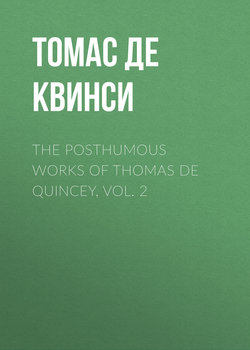Читать книгу The Posthumous Works of Thomas De Quincey, Vol. 2 - Томас Де Квинси - Страница 3
I. CONVERSATION AND S. T. COLERIDGE
EDITOR'S NOTE TO THIS ESSAY
ОглавлениеCertainly this idea of De Quincey about the misfortune to Coleridge of the early loss of his father, separation from his mother, and removal from Devon to London, is fully borne out by the more personal utterances to be found in Coleridge's poems. Looking through them with this idea in view, we are surprised at the deposit left in them by this conscious experience on Coleridge's part. Not to dwell at all on what might be very legitimately regarded as indirect expressions of the sentiment, we shall present here, in order to add emphasis to De Quincey's position, some of the extracts which have most impressed us. From the poem in the Early Poems 'To an Infant,' are these lines:
'Man's breathing miniature! thou mak'st me sigh—
A babe art thou—and such a thing am I,
To anger rapid and as soon appeased,
For trifles mourning and by trifles pleased,
Break friendship's mirror with a tetchy blow,
Yet snatch what coals of fire on pleasure's altar glow.'
Still more emphatic is this passage from the poem, 'Frost at Midnight':
'My babe so beautiful! it thrills my heart
With tender gladness thus to look at thee,
And think that thou shalt learn far other lore,
And in far other scenes! For I was reared
In the great city, pent 'mid cloisters dim,
And saw nought lovely but the sky and stars.
But thou, my babe! shalt wander like a breeze
By lakes and sandy shores beneath the crags
Of ancient mountain, and beneath the clouds,
Which image in their bulk both lakes and shores
And mountain crags; so shalt thou see and hear
The lovely shapes and sounds intelligible
Of that eternal language, which thy God
Utters, who from eternity doth teach
Himself in all and all things in Himself.
Great Universal Teacher! he shall mould
Thy spirit, and by giving make it ask.'
In another place, when speaking of the love of mother for child and that of child for mother, awakened into life by the very impress of that love in voice and touch, he concludes with the line:
'Why was I made for Love and Love denied to me?'
And, most significant of all, is that Dedication in 1803 of his Early Poems to his brother, the Rev. George Coleridge of Ottery St. Mary, when he writes, after having dwelt on the bliss this brother had enjoyed in never having been really removed from the place of his early nurture:
'To me the Eternal Wisdom hath dispensed
A different fortune, and more different mind—
Me, from the spot where first I sprang to light
Too soon transplanted, ere my soul had fixed
Its first domestic loves; and hence, through life
Chasing chance-started friendships. A brief while
Some have preserved me from life's pelting ills,
But like a tree with leaves of feeble stem,
If the clouds lasted, and a sudden breeze
Ruffled the boughs, they on my head at once
Dropped the collected shower: and some most false,
False and fair-foliaged as the manchineel,
Have tempted me to slumber in their shade
E'en 'mid the storm; then breathing subtlest damps
Mixed their own venom with the rain from Heaven,
That I woke poisoned! But (all praise to Him
Who gives us all things) more have yielded me
Permanent shelter: and beside one friend,
Beneath the impervious covert of one oak
I've raised a lowly shed and know the name
Of husband and of father; not unhearing
Of that divine and nightly-whispering voice,
Which from my childhood to maturer years
Spake to me of predestinated wreaths,
Bright with no fading colours!
Yet, at times,
My soul is sad, that I have roamed through life
Still most a stranger, most with naked heart,
At mine own home and birthplace: chiefly then
When I remember thee, my earliest friend!
Thee, who didst watch my boyhood and my youth;
Did'st trace my wanderings with a father's eye;
And, boding evil yet still hoping good,
Rebuked each fault and over all my woes
Sorrowed in silence!'
And certainly all this only gains emphasis from the entry we have in the 'Table Talk' under date August 16, 1832, and under the heading, 'Christ's Hospital, Bowyer':
'The discipline of Christ's Hospital in my time was ultra-Spartan; all domestic ties were to be put aside. "Boy!" I remember Bowyer saying to me once when I was crying the first day of my return after the holidays. "Boy! the school is your father! Boy! the school is your mother! Boy! the school is your brother! the school is your sister! the school is your first cousin, and all the rest of your relations! Let's have no more crying!"'
